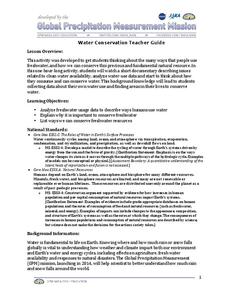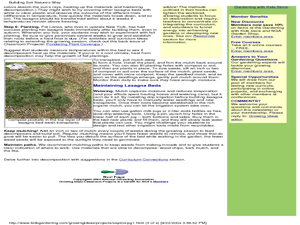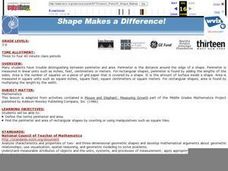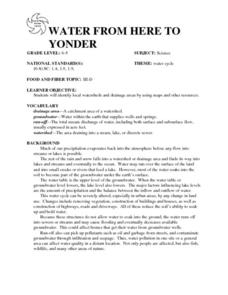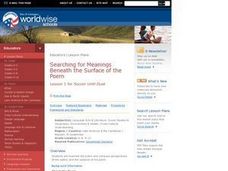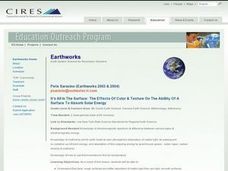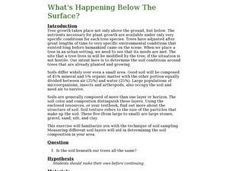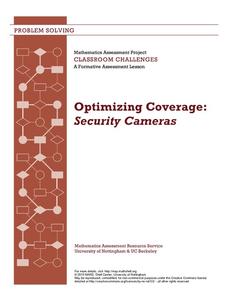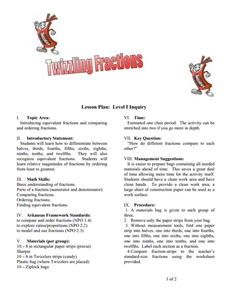Teach Engineering
Manned Mission to Mars
To go or to not to go — the question for a mission to Mars. This resource provides details for a possible manned mission to Mars. Details include a launch schedule, what life would be like on the surface, and how the astronauts would...
NOAA
Ocean Zones
How can organisms light up in water? Bioluminescence is light produced in a chemical reaction that can occur in an organism's body. First, learners determine what happens to light/color as you move into the deep ocean. In groups, they...
Polar Bears International
Top of the World
Learn about polar bears and the Arctic circle with a lesson about the countries and conditions of the region. After examining how the area differs from Antarctica, kids explore climates, animals, and geographical position of countries in...
Curated OER
Water Conservation
Open learners' eyes to the challenge of finding safe drinking water – something we often take for granted in our country. The PowerPoint presentation includes images, graphs, diagrams, and even a video to stimulate discussion on how we...
Teach Engineering
Take Off with Paper Airplanes
Let's go fly a kite ... oops, a paper airplane! The 13th segment in an aviation unit of 22 relates the parts of an airplane to paper airplanes. Pupils learn the functions of the control surfaces of a plane to really make their knowledge...
Curated OER
Building Soil Nature's Way: Exploring decomposition and soil health
Students explore decomposition and soil health by creating their own garden. In this agriculture lesson, students build a "lasagna garden" with organic matter found in the area and plant perennials native to their region. Students are...
Curated OER
Coal Derivatives by Destructive Distillation
Chemists use the destructive distillation technique to produce three derivatives from a sample of bituminous coal. You will find background information, a materials list, procedures, and sample follow-up questions that you can use in...
Chicago Botanic Garden
Climate Change Impacts on Ecosystem Services
The fourth activity in a series of five has classes participate in a jigsaw to learn about global impacts of climate change and then share their new information with a home group. Groups then research impacts of climate change (droughts,...
Curated OER
Shape Makes a Difference!
Learners learn the difference between perimeter and area by watching a video and a hands on activity.
Curated OER
WATER FROM HERE TO YONDER
Middle schoolers identify local watersheds and drainage areas by using maps and other resources. They are given copies of the water cycle. Students discuss the movement of water in the environment. They observe, record and transfer...
Curated OER
To Be Or Not To Be, Soaked
Students test the absorbency of paper towels by dropping water onto the center of each towel and then find the surface area of the stain using a transparent grid. With both pieces of data, students analyze the results of their absorbency...
Curated OER
Searching for Meanings Benath the Surface of the Poem
Students read "Soccer Until Dusk". As a class, they discuss the various settings and actions in the poem and discuss the life in Guatemala and compare it with the United States. To end the instructional activity, they complete a...
Curated OER
It's All In The Surface: The Effects Of Color & Texture On The Ability Of A Surface To Absorb Solar Energy
Ninth graders examine how dark surfaces absorb more light than light surfaces. They perform an experiment that compares various surfaces abilities to absorb heat, then record and analyze the results.
Curated OER
What's Happening Below The Surface?
Students determine the soil composition of soil layers in their area. They collect soil samples, calculate the percentage soil water content, analyze data, and evaluate each site for future tree growth.
Curated OER
Surface Water Supplies And The Texas Settlements
Pupils engage in a lesson that is concerned with the allocation and finding of water resources. The location of different settlement areas is considered as one looks how the water is distributed. They map some of the early Spanish and...
Curated OER
Finding the Mother Lode
Students engage in a paper treasure hunt to find a lode deposit of gold using the placer deposit concentrations of metals found in stream sediments. They use topographic maps and metal concentrations to assist them. Students discuss the...
Curated OER
Classify Prisms
Students classify prisms according to their attributes. In this classifying prisms lesson, students explore different prisms. Students generate observations of the attributes and classify the prism correctly.
Mathematics Assessment Project
Optimizing Coverage: Security Cameras
Are you being watched? Class members determine where to place security cameras protecting a shop. They then evaluate their own and several provided solutions.
Alabama Wildlife Federation
Forest Floor Investigation
Most living things go unnoticed. Change that using a fun activity about the nutrient cycle. Pupils use hula hoops to mark areas of study and then make observations about the living things they see. They first make surface observations,...
Curated OER
Iron Fertilization - Pumping Iron
The theory that adding iron to ocean water may increase phytoplankton ability to remove carbon dioxide from the atmosphere is examined. The Monterey Bay Aquarium Research Institute is monitoring conditions off the California coast to...
Curated OER
Antibiotic Resistance
Students using the scientific method, study bacteria as a covering surface of the earth in many forms. They discover that not all bacteria is bad and introduce the topic of antibiotic resistance. Science Fair expectations are addressed.
Illustrative Mathematics
Shape Hunt Part 1
The hunt is on! Send young mathematicians on a search for shapes in the first lesson of this two-part series. Each time a child finds a hidden shape, he draws it on his paper, and continues searching for the rest. Perform this activity...
University of Arkansas
Twizzling Fractions
Using food as a manipulative is one of the best ways to incorporate hands-on learning in the classroom. This hands-on approach allows young mathematicians to compare, order, and identify fractions with the use of Twizzlers® and fraction...
Curated OER
Water Monitoring Vocabulary
As the title implies, this is a list of vocabulary terms relating to water monitoring. If your ecology class is learning about how to test water quality, this will be an appropriate reference sheet for them. As a bonus, if you live in...





